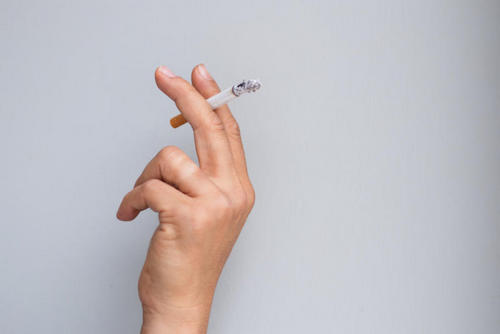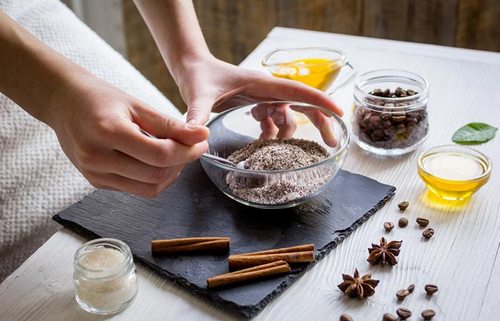For clarity, we define what acute respiratory disease (ARI) is. This is most often a viral (rather than bacterial) infection, which is manifested by nasal congestion, snot, sneezing, coughing, sore throat, chills, fever and / or headache.
Without treatment, acute respiratory infections pass in 3-10 days. True, in a quarter of patients the unpleasant state will last for a couple of weeks, smokers are most likely at risk. On average, an adult suffers 2-3 ARIs per year.
Sick ARI is not such a troublesome and unpleasant thing – it’s enough not to interfere with the body recovering. And for this you need to have the courage and abandon the meaningless events, which since childhood have been firmly connected for us with recovery, which in reality comes by itself.
If in childhood you dispensed with iodine nets, mustard plasters and tea with lemon, but acidic, then you apparently immigrated to Russia after coming of age. In fact, ARI requires much less fuss than we are used to thinking, and the effect will be much better. We warn you that this text may cause resentment and denial, but in the end you will have to come to terms: garlic is useless, with a sore throat you need to eat ice cream, and the iodine net is evil.

If the onset of the disease is sharp and severe, you feel aching all over your body, tiredness, then most likely you have the flu and you should go to a doctor immediately who will prescribe an antiviral drug.
Step 1. Accept that you can’t do anything with the virus itself.
Unfortunately, the invention of antiviral drugs is especially difficult, and now there is only a cure for the flu, but the human body has to fight ARVI itself. Fortunately, he often succeeds in this. If you just remembered about antiviral drugs, which are actively advertised and in the pharmacy are certainly on the main window, you can safely forget about them. In the West, these funds are not, as they have not proved their effectiveness and safety in qualitative research. In general, just put up with the fact that you can’t speed up your recovery.
Step 2. Take care of others
For some reason, it’s customary to score. The sick person goes to work at rush hour, wipes his nose with his hand and grabs the handrail, sneezes and coughs actively, and then spends nine hours indoors, generously sharing his virus with colleagues. Agree, this is not very beautiful. If for some reason you still need to appear at work, put on a medical mask and change it every four hours. If you don’t put it on, cough and sneeze, covering yourself with your hand (and then wash your hands with soap or alcohol-containing gel: the virus can skin for about two hours). Ask loved ones not to touch your lips, nose or eyes while talking to you so that they do not bring the virus in.
Important: the patient is better not to contact people for the first 2–4 days, since at this time the person is especially contagious. But a week after the onset of the first symptoms, it is no longer so dangerous for others.
Kiss, by the way, you can: nothing is transmitted through saliva, but staying next to a sick person is still dangerous, as you can inhale droplets of mucus containing the virus from the respiratory tract.
Step 3. Help your body fight the infection.
But not immunomodulators. They are still useless at best, and in the West, again for this reason, they are not used. It is very important that the air in the room was with normal humidity of 40-60 percent – then it will be easier for the mucosa to do its job. (Usually in such a situation you can’t do without a humidifier.) For this, you need to drink a lot. Mandatory. To make it easier to deal with heat, it is best to maintain a room temperature of 18-20 ° C. If you wish, you can take a shower in which the temperature of the water will be approximately equal to the temperature of your body. Try to create peace for yourself so as not to interfere with the body’s ability to deal with the virus, do not eat through force. But if you feel normal, you do not have fever, fatigue and muscle pain,You can even work out. So you can even temporarily get rid of nasal congestion.
Step 4. Help yourself
Doctors of the American Mayo Clinis write in an article on medicines for ARI : “if you have a cold, you are likely to be sick for a week or two. But this does not mean that you need to be unhappy. ” Actually, so that a person does not especially suffer from acute respiratory infections, there are drugs for symptomatic treatment. In other words, almost all of the unpleasant manifestations of acute respiratory illness can be eliminated to one degree or another.
Runny nose
Probably, saline solutions (they can be done at home, only with caution) can cope with a runny nose. However, this is not fully proven.
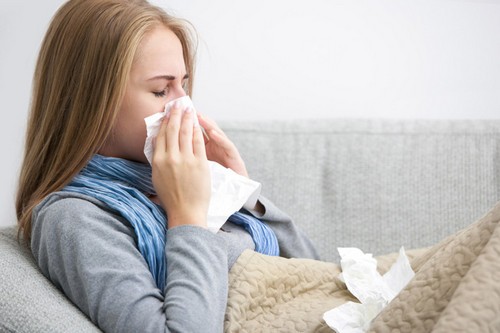
There is also reason to believe that the spray containing ipratropium bromide reduces the number of snot and allows you to sneeze less often. Thanks to the spray with cromoglic acid, the nose will also flow less, you will not sneeze and cough so often.
Handle vasoconstrictor drugs (decongestants) very carefully: if you use them for more than 3-5 days, you run the risk of getting a runny nose caused by them. Although the temptation to use them for longer, of course, is great: they give a wonderful effect, including removing the stuffy nose for a while.
Using antihistamines does not make much sense, like glucocorticoids in the form of a nasal spray.
Cough
It is far from always necessary to fight cough. It is often useful – it often eliminates sputum. In most cases, he leaves after three weeks and does not require any treatment. So it is better not to use antitussive drugs, especially right away.

Expectorants like guaifenesin and other mucolytics should not be used for acute coughing, as there are no well-founded arguments for or against these drugs in a similar situation.
Honey when coughing has a softening effect, at least in children.
Fever
To bring down or not to bring down the temperature is a difficult question. In principle, there are two specific indications for vigorous action: temperature above 39 ° C and extremely poor health. The general opinion so far is: be patient, be patient. Moreover, the elevated temperature is not as scary as it is customary to think about. Unfortunately, it is not completely clear whether we are delaying the course of acute respiratory infections, bringing down the temperature to normal immediately. Logically, yes, it’s better not to do this, because, for example, some viruses and bacteria do not tolerate it well. However, there is still no evidence of such harm.
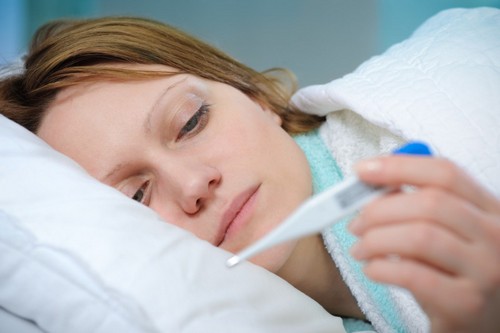
If you still decide to get to 36.6 ° C as quickly as possible, the worst thing you can do is grind with vodka, vinegar or ice water. Vodka creates only the appearance of cooling, while it can greatly dry the skin and enter the bloodstream. Any strong cooling leads to the fact that the vessels of the skin narrow and do not give off heat, while inside we are still quite hot, only there is nowhere to leave the heat.
You can still eat raspberries, it really helps to cope with the temperature, but it is much easier to take paracetamol or some non-steroidal anti-inflammatory drug like ibuprofen. And, of course, do not stop your body from losing heat, maintaining a normal temperature in the room and drinking plenty of fluids so that there is something to sweat.
Headache, sore throat
Paracetamol and ibuprofen are not only antipyretic drugs, but also painkillers. Therefore, they will also help you relieve headaches and aches.

Sprays with anesthetic do not relieve pain more effectively than lollipops, while lollipops affect longer. A cheap anesthetic option – cold drinks, ice cream, fruit ice, etc. – is psychologically difficult to take, but try at least once. “It’s like putting an ice pack on a bruise, or many remember that after removing the tonsils in childhood they gave ice cream, the same principle is to reduce swelling, inflammation and / or decrease sensitivity,” explains general practitioner Dmitry Troshin.
Local antiseptics in the form of sprays, gargling with a variety of solutions does not look very effective. However, if this makes you feel better, you can always use such tools.
And a couple more tips:
- pay attention to the active substance of the drug, and not to the commercial name. One ibuprofen under different names in the Russian market – about 100 options. That is, you can drink tea “from a cold” from a pharmacy in which paracetamol will be, and then use it in the form of a tablet, not knowing that you are taking the same substance and with a brisk step you go to an overdose;
- Do not wear contact lenses – they contribute to the accumulation of bacteria and viruses, that is, if something is not right on your mucous membrane, it will linger there and quite likely organize conjunctivitis.
How not to be treated
There are funds that, in principle, can be suitable as psychotherapy (“I do something, I help myself recover faster”), but in fact they have no effect, and sometimes they do harm. Take, for example, an iodine grid. Iodine can easily penetrate the bloodstream through the skin and lead to problems with the thyroid gland. The solution of Lugol will achieve the same, which includes iodine and even better penetrates through the mucous membrane of the mouth.
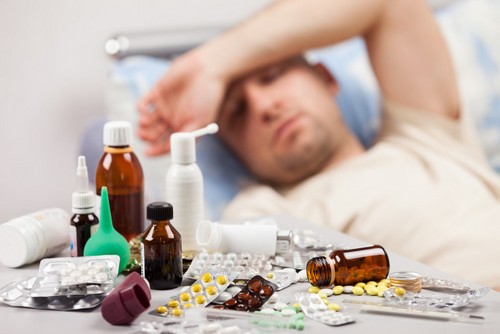
Banks leave bruises and burns, and there is no evidence of their effectiveness. Mustard plasters also have no effect on the course of acute respiratory infections: “The action of mustard plasters is straightforward. When a mustard plaster bakes, it becomes bad when it is removed, it immediately becomes easier, ” explains general practitioner Alexander Ryltsov. Soaring legs is a story of the same order.
Echinacea does not work with acute respiratory infections. There is no reason to believe that garlic will speed up your recovery. It will most likely help others who will stay away from you and not get sick. It is better not to be treated with inhalations, since their benefits are doubtful, and the chance of getting a small burn of the respiratory tract is very real.
In order for vitamin C to somehow affect the course of acute respiratory infections, you need to take at least 200 mg per day daily. Then, when you get sick, ARI will be eight percent faster. That is, if you had been ill for a week without taking vitamin C, then after its preliminary daily use you would be sick for 6.5 days.
Prophylactic antibiotic treatment (to prevent the development of a bacterial infection) is not necessary, since there is no benefit from this, and a side effect in the form of diarrhea will develop with a high degree of probability.
If you find it difficult to come to terms with all this, watch the program of the famous pediatrician Yevgeny Komarovsky – he explains everything quite convincingly.
What if it’s bacteria?
Very rarely, a disease with symptoms of acute respiratory infections is bacterial. But at first finding out what we are dealing with is not easy. If only then, after improvement, the disease returns, then it’s more about a bacterial infection. Also, if all the conditions for recovery are created, but the disease has not disappeared in 10 days, it is worth thinking about its bacterial nature. By the way, the color of the snot has nothing to do with the diagnosis: green mucus can be with a viral infection.
If sore throat, then in 10 percent of cases, the cause is a bacterium called streptococcus. Typically, the symptoms of this disease are as follows : temperature above 38 ° C, enlarged lymph nodes in the neck, white purulent plaque on the side walls or back of the throat, no coughing, runny nose or redness of the eyes. In this case, you should immediately go to the doctor who will prescribe antibiotics. It is unreasonable and dangerous to be treated with any antibiotics that have remained in the medicine cabinet from the last time, to put it mildly.
In 0.5–2 percent of cases, acute sinusitis (inflammation of the mucosa of the paranasal sinuses) is bacterial, and usually it is a complication of the virus. It is manifested by nasal congestion, thick yellow or green snot, pain in the teeth, pain or pressure in the face (aggravated when a person leans forward). With this, it is also better to go to the doctor, who, by the way, can decide that you do not need antibiotics – sinusitis usually goes away by itself.
When you urgently need to go to the doctor
There are situations when SARS may not be SARS, but a more serious disease. Or an acute respiratory illness is for some reason too difficult for you. Then you need to go to the doctor.
And here are some specific reasons for this :
- temperature 38.9 for a long time, with fatigue and muscle pain;
- breathe heavily;
- chest pain or pressure;
- fainting or pre-syncope;
- confused consciousness;
- frequent vomiting
- severe pain in the area of the paranasal sinuses or forehead;
- heavily swollen lymph nodes in the neck or jaw.
The doctor will ask about the symptoms, conduct an examination and explain what is really going on with you.

